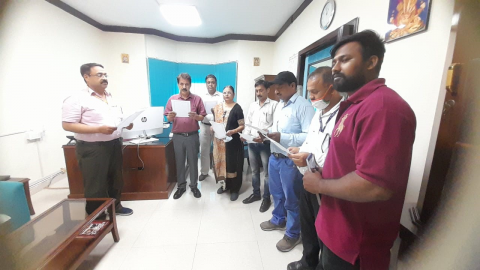Settlement Commission Under Customs, Central Excise & Service Tax Act
The Customs, Central Excise and Service Tax Settlement Commission provides an alternate dispute resolution mechanism for taxpayers who wish to resolve tax disputes in a spirit of conciliation rather than litigation. Chapter V of the Central Excise Act 1944, Section 83 of the Finance Act, 1994 (Service Tax) and chapter XIV of the Customs Act 1962, contain provisions for "settlement of cases" through the Commission.
Any taxpayer to whom a show cause notice has been issued and the case is still to be adjudicated, can make an application in the prescribed form, containing a full disclosure of his accepted duty liability & interest, while arguing against those issues which he contests.
The Commission refers the Application of the Taxpaxyer to the authority who has issued the show cause notice for review and comments. Thereafter, the Commissioner (Investigation) appointed to each of the Benches of the Commission (Chennai, Delhi, Kolkata and Mumbai) examines the application before a hearing is fixed in the matter. The taxpayer or his duly authorised representative (which means an advocate or consultant or employee of the Applicant) are required to make an application in the forms notified for the purpose and shall be given opportunity to be heard in person. Thereafter, the Commission issues a speaking order on the application in final settlement of the tax dispute. Every order of settlement passed is conclusive as to the matters stated therein and no matter covered by such order is reopened in any proceeding by the Department.
The Commission is also duly empowered to grant immunities against prosecution, fines and penalties, where deemed fit.
Please refer to the Public Notice No. 01 / 2022 regarding the Chairman and Members appointed to all the Benches of the Commission.
Presently there is no provision for settlement of cases pertaining to GST matters.
- The Settlement Commission has powers to grant immunity from prosecution for any offence under the Central Excise Act, the Customs Act or under the Indian Penal Code or under any other Central Act for the time being in force in respect of the case covered by the Settlement Commission.
- The Commission also has powers to grant immunity either wholly or in part from the imposition of any penalty and fine under the Central Excise Act or the Customs Act, as the case may be in respect of the case covered by the Settlement Commission.
- The proceedings before the Settlement Commission shall be deemed to be a judicial proceeding within the meaning of Section 193 and 228, and for the purposes of Section 196 of the Indian Penal Code.
The following category of cases are excluded from the purview of the Settlement Commission
- Cases relating to Customs duty where no Bill of Entry or Shipping Bill , or a bill of export, or made a baggage declaration, or a label or declaration accompanying the goods imported or exported through post or courier, as the case may be, has been filed.
- Cases relating to Central Excise duty where no monthly returns showing production, clearances and Central Excise Duty paid in the prescribed manner has been filed. Cases relating to Service Tax where no return has been filed. Provided further that the Settlement Commission, if it is satisfied that the circumstances exist for not filing the returns, allow the applicant to make such application.
- Cases where no Show Cause Notice has been issued to the applicant.
- Cases where the additional amount of Central Excise Duty/Customs Duty/Service Tax accepted by the applicant in his application does not exceed `3 lakh.
- Cases involving interpretation of the classification of goods under the Central Excise Tariff Act, 1985 or the Customs Tariff Act, 1975.
- Customs, Central Excise and Service Tax cases which are pending with the Appellate Tribunal or with any court at the time of making the application.
- Customs cases to which section 123 of the Customs Act applies or cases under the NDPS Act.



